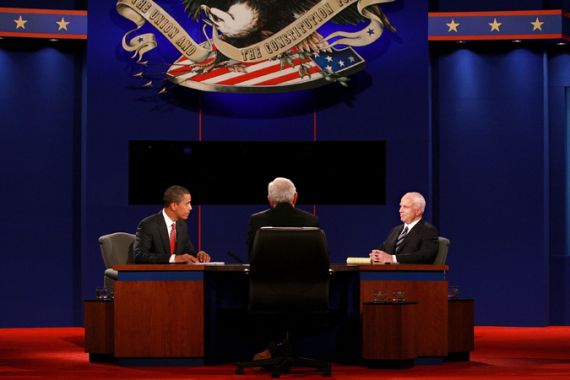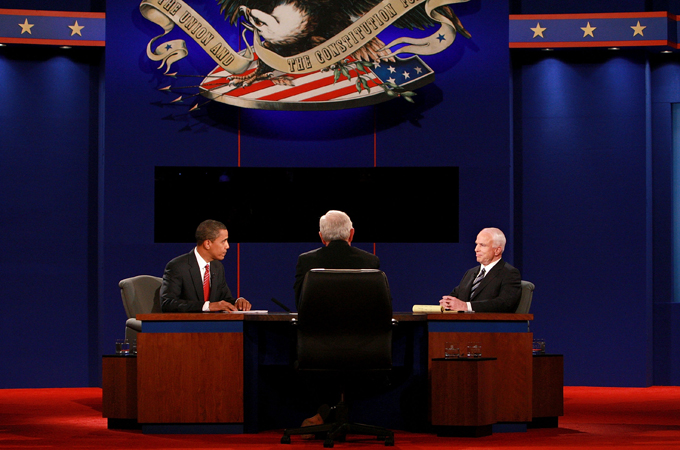What’s the matter with third parties?
Many US voters are dissatisfied with both Democrats and Republicans – but smaller parties face significant hurdles.

 |
| Third-party candidates often lack national platforms like presidential debates to share their viewpoints [GALLO/GETTY] |
Barnwell, South Carolina – It’s no secret that many in the US are disillusioned with national politics.
Today, just fifteen per cent of US voters say that their country is “headed in the right direction”. Even fewer – 11 per cent, according to a Gallup poll – approve of the performance of Congress, almost all of whose members are either Democrats or Republicans. And a survey taken last year found that over half say a third party is needed in US politics.
So why, as the 2012 presidential election approaches, haven’t candidates from smaller parties been able to gain traction?
It has happened in the past: In 1992, billionaire businessman H Ross Perot, who ran as an independent, appeared at one point to have a shot at winning the race – and ended up with 18.9 per cent of the vote.
Cash rules everything
When asked why third-party presidential candidates have met with limited success, Howard Phillips, a Nixon administration official who ran for president three times on the Constitution Party ticket, gave Al Jazeera a simple answer: “Money.”
Phillips made his presidential runs in the 1990s. “We tried to get funding wherever we could,” he explained. “But without money, you’re not going to get very far.”
In 2008, Barack Obama raised a staggering $778m, more than any other presidential candidate in US history. His Republican opponent that year, John McCain, took in $383m. By comparison, no third-party or independent candidate was able to raise more than $5m.
Money is by no means entirely determinative of the winner. In 2008, Rudy Giuliani spent $59m in an attempt to win the Republican Party’s presidential nomination. He failed to win in any states, and dropped out of the race shortly after it started. And although the amount of money a candidate raises is certainly correlated with his chance of success, it’s not necessarily a causal relationship: it could be that candidates who have a message that resonates with voters are able to raise more money than their opponents, not the other way around.
Regardless, money is the “mother’s milk” of modern politics, as California politician Jesse “Big Daddy” Unruh memorably put it. It’s necessary for campaign buses and jets, paying staffers and strategists, renting office space, fending off lawsuits, and – perhaps most importantly in this election cycle – buying advertising.
Last month’s events are instructive in this regard. In early December 2011, presidential candidate and former Speaker of the House Newt Gingrich was riding high in Iowa; about 30 per cent said they planned to vote for him in the Republican caucus.
But Romney-supporting “Super PACs” – political action committees which can raise unlimited funds from corporations and unions – dumped millions of dollars’ worth of attack ads against Gingrich, who then plummeted in the polls. When Iowa voted on January 3, Gingrich ended up with just 13 per cent of the vote.
Ralph Nader, the consumer advocate who has run for president in every election since 1992, agrees with Phillips’ analysis. “If we want a third party in this country, unfortunately it’s going to have to be a multibillionaire,” he said. “The multibillionaire gets press by definition. Once you get wide press, the pollsters poll you. [Then] you get into the media’s mania with the horse race.”
Ballot access
Nor is it easy for candidates from smaller parties to get their names automatically printed on election ballots. All 50 US states have different criteria for candidates and parties to have their names listed on ballots. Voters can, in most states, write in the name of a candidate they support on their ballot, but these “write-in campaigns” are notoriously hard to win.
In fact, Nader says, the US and Switzerland are the only two first-world democracies without national ballot access laws.
Navigating this legal quilt is often difficult for poorly funded third parties, which tend to lack the organisational vim and resources needed to get their candidates’ names on ballots. Most states require that third parties gather a certain number of signatures in order to demonstrate that they have a significant base of support.
For example, California – whose 55 electoral votes are important for any presidential candidate to win – requires that a party obtain more than a million signatures for that party’s candidates to be automatically listed at the polls. Only parties that received more than two per cent of the vote in the previous election are exempt from this requirement.
Richard Winger, an expert on ballot access laws who has been publishing a monthly newsletteron the topic since 1985, and a one-time third-party candidate (he ran for California Secretary of State on the Libertarian Party ticket in 1986, receiving 1.5 per cent of the vote), does not believe that ballot access is a lost cause – sometimes, Democratic or Republican legislators can be convinced to ease the laws, and sometimes federal courts strike down overly stringent ballot access laws.
|
“[US voters were] ingrained with the two-party mentality. It’s almost like something that’s in the DNA. They view third parties with suspicion.” – Gary Odom, Constitution Party field director |
But, Winger added wistfully, “it’s been very slow going lately”. In 2011, several states (Oklahoma, Alabama, Colorado, Nevada, and Arkansas) reduced the amount of time third parties have to gather signatures to gain ballot access.
Two-party system
A majority of Americans say a third party is needed in US politics. But while they may like the idea, they tend not to be eager to vote for an actual third-party presidential candidate.
Kyle Kondik, director of communications at the University of Virginia’s Centre for Politics, notes that the Democrats and Republicans have a long history – both have existed since before the Civil War. As a result, he says, “people identify pretty strongly with one party or the other – whereas I think people are much less familiar with the basic tenets of those [third] parties”.
Gary Odom, the field director of the conservative Constitution Party, added that US voters were “ingrained with the two-party mentality. It’s almost like something that’s in the DNA. They view third parties with suspicion”.
The resignation to a two-party system in the US is so deeply rooted that even the popular TV show The Simpsons structured an episode around it. In the episode, which aired just before the 1996 presidential election, US voters discover that two space aliens have appropriated the bodies of the Democratic and Republican candidates Bill Clinton and Bob Dole. “It’s a two-party system; you have to vote for one of us!” says the Clinton impostor – who wins the election and proceeds to enslave the human race.
Part of the difficulty is that third-party candidates often lack a national platform to express their viewpoints. Since 1988, the Commission on Presidential Debates – a non-profit corporation run by former heads of the Democratic and Republican Parties – has set the rules for who can appear in presidential debates. Both Nader and Pat Buchanan, a former Nixon aide who ran as the Reform Party’s nominee in 2000, said appearing in the debates was critically important.
Nader pointed out that Ross Perot’s poll numbers skyrocketed when he was allowed to debate Bush and Clinton in 1992. And Buchanan recounted that “when Nader and I didn’t get into the debates” in the 2000 election, “I told him: ‘We’re playing in the Gator Bowl, and those guys are in the Super Bowl.'”
Voters’ hesitance could also be explained by the so-called “spoiler effect” – that by voting for a candidate who has little chance of winning, you may siphon away votes from a major-party candidate whose views are close to yours.
“The votes I got in 2000,” said Buchanan, “while they were very small, they cost [George W] Bush four states.”
That same year, Nader was blamed for costing Democrat Al Gore the election: Had more Nader voters chosen Gore instead, the argument goes, Bush would have lost key swing states – and the election.
But Jim Hedges, an activist involved with the Prohibition Party, which supports banning the production and sale of alcohol in the US, places some of the blame on third parties themselves: “Third-party people have to have credible candidates, and not flakes,” stresses Hedges. In bygone days, Hedges says the Prohibition Party’s candidates “were people who had nationwide reputations – they were people who had been successful at other things”.
And Micah Sifry, a blogger and author who has written extensively on third parties in the US, says that the major parties tend to attract better organisers and managers. “If you know anything about how to put together a successful political campaign, you don’t tend to choose long shots. The people who are attracted to long-shots are often less realistic in other ways, too.”
Americans Elect
In response to the recent lack of success experienced by third party candidates, a new group, named Americans Elect, is attempting a new approach to the political system.
In 2008, none of the third-party candidates that won a significant number of votes could be described as moderates or centrists; their views were either to the left or right of both major-party candidates. Would voters be more likely to choose a third-party candidate if he or she ran a centrist campaign? That’s what Americans Elect is banking on this election season.
Americans Elect – founded in 2011 by wealthy investor Peter Ackerman – doesn’t call itself a political party. Instead, it presents itself as a non-partisan organisation without a preconceived political platform.
This summer it plans to hold an online primary, open to all registered US voters, to choose its presidential nominee. This, says its website, will “help break gridlock and change politics as usual. No special interest. No agendas.”
Despite the lack of details, the group is probably aiming to nominate a centrist. Dagny Leonard, the deputy press secretary of Americans Elect, told ABC News she thinks that “people are looking for a candidate that will discuss issues and solve problems rather than pandering to extremes of either party”. And the eventual nominee will be required to pick a running mate from another party.
Unlike many previous third-party efforts, Americans Elect appears to have both the money ($22m, says CNN) and the access necessary to run a competitive campaign. It’s already obtained ballot access in at least 15 states, including always-difficult California, and says it expects to qualify in all 50 – a feat that no third party accomplished in 2008.
However, some have criticised the group for its lack of transparency. Americans Elect has registered itself with the Internal Revenue Service not as a political party but as a 501(c)(4) “social welfare organisation”, which enables it to maintain tax-exempt status and avoid disclosing who its donors are.
Nor is it clear that online voters would have the final say on the group’s nominee. Americans Elect’s bylaws stipulate that a Candidate Certification Commission picked by the group’s board will be able to, in the bylaws’ words, “ensure that only persons capable of performing the duties of president and vice president are eligible for voting by the registered Delegates” – meaning that they would have effective veto power over the nominee chosen by voters.
So far, the most prominent politician to announce he’s running for the Americans Elect nomination is Buddy Roemer, the former Republican governor of Louisiana. But Roemer, whose campaign has focused on the corrupting influence of money in politics, has been performing poorly in the Republican primaries – he received just 941 votes in New Hampshire.
Follow Sam Bollier on Twitter: @SamBollier